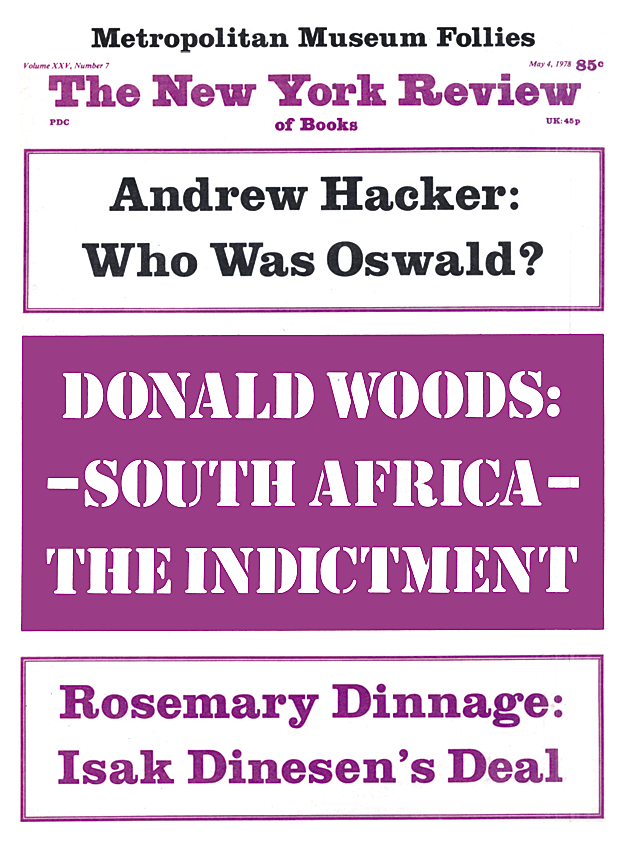In response to:
Confessions of a Jewish Dissident from the March 9, 1978 issue
To the Editors:
I. F. Stone’s piece “The Mideast—Confessions of a Jewish Dissident” (NYR, March 9) evoked in me both strong agreement and serious objection. It is ironic that in Israel, itself, there is open debate on issues of national policy, whereas one can practically be stoned for saying the same thing in an American public forum! If it is true that the strongest case Israel has is its commitment to democratic principles, then allowing the general American public to become aware of the degree of dissent in Israel on the Palestinian issue, for instance, would strengthen support of Israel, not threaten it.
I, for one, was happy that Shimon Peres presented the views of the loyal opposition at the session of the Kenesseth at which President Sadat spoke, and I was even pleased that Moshe Wilner, that inveterate odd-ball of Israeli politics, rose to speak, in the traditional disregard for propriety, and with completely bad timing, to ask for his right to be heard. President Sadat was treated to the atmosphere of the “Zionist Congress” type of political arena; at once so Jewish, and yet so parliamentary in its dynamics.
On the other hand, I feel that I. F. Stone is living in the past when it comes to the Palestinian question, itself, and I think he was quite unfair in maligning the notion of self-rule. The Dayan plan, made public quite some time before Sadat’s visit, is, as a New York Times editorial opined some months ago, a potentially open-ended plan, and might just do the trick, if allowed time to work. You start with restoring Arab governance in certain areas, and a couple of ministries begin to operate, and you may end up, in five to ten years, with de facto independence for the Palestinians. And then—facts could be codified in treaties.
I also fail to understand why, in a Palestinian state, there could not be Jewish residents and Jewish settlements, especially in areas where there were Jewish settlements before 1948; as, for example, in the Hebron area. Is I. F. Stone endorsing the idea of a Palestinian state that is Judenrein? Would the presence of some Jewish communities in a putative Palestinian state violate Palestinian sovereignty, any more than the presence of about 400,000 Arab citizens in Israel violates Israeli sovereignty?
The sin of Israeli governments, especially of the Ma’arakh, labor coalition, has been one of omission: the upper echelons, most notably the oligarchy that clustered in Golda Meir’s kitchen, had too many blind-spots on the Palestinian question. The minority Rafi group, which is Moshe Dayan’s political matrix, by the way, had fewer illusions that the Palestinian problem would go away; or that it was someone else’s problem. It simply took too long for the Israeli government to face up to the seriousness of this issue, which could be solved in more than one way, but which must be addressed by those in power, openly and honestly. In this respect, I think Begin has it over his predecessors, and has shown more initiative than would have been conceivable for Golda Meir, or Yitzhak Rabin.
So much for the misjudgments of the recent past. What do we do now? We encourage open discussion, without looking down our noses at current Israeli proposals. We must be asking ourselves whether or not there is real danger in an immediate establishment of a Palestinian state. What about the new “zigzag” tactics of the Carter administration? What does I. F. Stone truly think the American Jewish leadership should do about the current proposal to sell so much advanced military equipment to Saudi Arabia, in particular? Can we isolate the Palestinian problem from the overall configuration of the Mideast conflicts (plural intentionally used)? Even he admits that an interim period of adjustment is reasonable.
I, too, feel compassion for refugees, whether they be Vietnamese boat-people, or Palestinians. The thought that a Palestinian Galuth or diaspora is emerging troubles me, too, and I often ask myself: Is Israel primarily responsible for the tragic dimensions of this situation? Have I, as an active Zionist, aided in creating a dispersed people? As I see it, the Palestinians have been betrayed primarily by their Arab partners, who don’t give a damn about them, as people, and who send them out to kill and be killed only because such acts may hurt Israel. They use them diplomatically with the same deceitfulness. Arabs have murdered tens of thousands of Palestinians, kept them in a pariah state almost everywhere they govern, and their championing of the Palestinian cause is one of the great hypocrisies of the twentieth century! It is Israel that represents the last hope for the Palestinians, and they would undoubtedly have more chance of achieving real peoplehood, and creating a Palestinian society, under progressive Israeli guidance, than by becoming something similar to an autocratic Central American state, overnight! This is Israel’s challenge: to develop its initiatives further, to make its ultimate intentions clearer. I. F. Stone’s romantic attachment to “magnanimity” is theological, not historical!
Baruch A. Levine
Professor of Hebrew
Department of Near Eastern Languages and Literatures
New York University
New York, New York
This Issue
May 4, 1978


